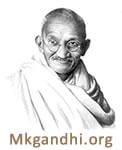Mahatma Gandhi
 Mrs Virbalaben Dalal was inspired by Mahatma Gandhi’s teachings of ahimsa, non-violence and his love of children. Mahatma Gandhi’s early education was in Rajkot, and she was inspired by his understanding that education is not just about excelling at academically, but in understanding the values of good and bad, and learning to become good citizens in life.
Mrs Virbalaben Dalal was inspired by Mahatma Gandhi’s teachings of ahimsa, non-violence and his love of children. Mahatma Gandhi’s early education was in Rajkot, and she was inspired by his understanding that education is not just about excelling at academically, but in understanding the values of good and bad, and learning to become good citizens in life.
“Literacy in itself is no education. Literacy is not the end of education or even the beginning. By education I mean an all-round drawing out of the best in the child and man – body, mind and spirit”.
M. K. Gandhi
Mohandas Karamchand Gandhi [2 October 1869 – 30 January 1948], was an Indian Lawyer, who was pivotal in the Indian freedom movement and was instrumental in bringing about India’s freedom on 15 August 1947. He is rightly called “Father of our Nation”. He spent his early formative years in Rajkot.
His Father Karamchand Gandhi, known as Kaba Gandhi an official member of the Rajasthanik Court, and Gandhiji studied at the Alfred High School in Rajkot. He developed his character and early experiments in truth were inspired during his education here.
He mentions two specific incidents in his Autobiography “M K Gandhi – The Story of My Experiments with Truth”:
- Examination: In his first year at high school during an examination on spelling, Gandhiji had misspelt the word ‘kettle’. The Education Inspector, Mr Giles saw it, and prompted him with his boot to copy the correct spelling from his neighbour’s slate. He refused to do so and was the only student who misspelt that word. His teacher made a point of reminded him of his stupidity. Mahatma Gandhi states “I could never learn the art of copying”.
- Childhood Inspirations: Gandhiji says “As a rule, I had a distaste for any reading beyond school books. The daily lessons had to be done because I disliked being taken to task by my teacher as much as I disliked deceiving him. Therefore I would do my lessons without my mind to it”.
However, Gandhiji saw a book purchased by his Father called Shravan Pitribhakti Nataka [play on Shravan’s devotion to his Parents: Shravan]. This book left an indelible impression on his mind. Similarly, Harishchandra was another play which haunted his mind [Raja Harishchandra was an ancient Indian King who was legendary for being just, kind and honest: Harischandra].
He says in his Autobiography “To follow the truth and to go through all the ordeals Harishchandra went through was the one ideal it inspired in me. Both Harishchandra and Shravana are living realities for me”.
Gandhiji’s belief of education was in understanding right from wrong, understanding one’s values and culture – having faith to stand for what one believes in and to become a good human being, and selfless service “seva”. Not to succeed by compromising one’s values and beliefs.
Virbalaben believed in these values. Jaibharat & New Jai Hind School had an initiative whereby students went to other Parents homes to carry out “seva” for free, for a few hours regularly. All voluntary donations received were sent to the School for Blind in Rajkot, every year. Donations and ticket sales received during Annual Functions and other events were also used to give all Teachers and other Staff [including Drivers, Ayahs and Cooks] a gift on Teacher’s Day by students, to show respect for their “gurus” and those who served them annually. This was also a way for children to learn to respect their Teachers and all who serve them, and to make all staff feel valued and to thank them for their contribution to the School.
Some of Virbalaben’s favourite Gandhiji’s quotes are:
- Education which does not mould character is wholly worthless.
- Education has to draw out the best from the boys and girls being educated.
- The real difficulty is that people have no idea of what education truly is. We assess the value of education in the same manner as we assess the value of land or of shares in the stock-exchange market. We want to provide only such education as would enable the student to earn more. We hardly give any thought to the improvement of the character of the educated. The girls, we say, do not have to earn; so why should they be educated? As long as such ideas persist there is no hope of our ever knowing the true value of education.
- If we are to teach real peace in this world, and if we are to carry on a real war against war, we shall have to begin with the children.
- In a gentle way, you can shake the world.
- Be the change that you wish to see in the world.
- If we could change ourselves, the tendencies in the world would also change. As a man changes his own nature, so does the attitude of the world change towards him. We need not wait to see what others do.
- I do not want my house to be walled in on all sides and my windows to be stuffed. I want the cultures of all lands to be blown about my house as freely as possible. But I refuse to be blown off my feet by any.
- A man is but a product of his thoughts. What he thinks he becomes.
